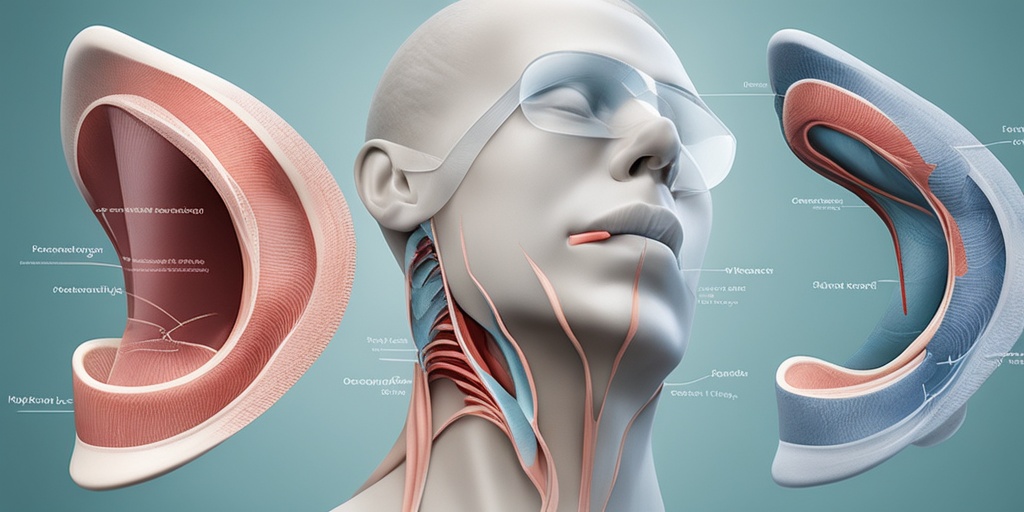“`html
What Is Dysphagia?
Dysphagia, commonly referred to as difficulty swallowing, is a medical condition that affects a person’s ability to swallow food, liquids, or even saliva. This condition can range from mild discomfort to severe impairment, making it challenging to consume essential nutrients and hydration. Dysphagia can occur at any age but is more prevalent in older adults, particularly those with underlying health issues.
Understanding the Mechanism of Swallowing
Swallowing is a complex process that involves multiple muscles and nerves. It can be divided into three phases:
- Oral Phase: This is the initial phase where food is chewed and mixed with saliva, forming a bolus (a small rounded mass). The tongue then pushes the bolus to the back of the mouth.
- Pharyngeal Phase: Once the bolus reaches the back of the throat, the swallowing reflex is triggered. The soft palate rises to close off the nasal passages, and the epiglottis folds down to cover the windpipe, preventing food from entering the lungs.
- Esophageal Phase: The bolus then travels down the esophagus through a series of muscle contractions known as peristalsis, leading it to the stomach.
When any part of this process is disrupted, it can lead to dysphagia. The causes can be varied, including neurological disorders, structural abnormalities, or even certain medications. Understanding the underlying cause is crucial for effective treatment.
Dysphagia Symptoms
Recognizing the symptoms of dysphagia is essential for early diagnosis and intervention. Symptoms can vary widely among individuals, but some common signs include:
- Difficulty Swallowing Food and Liquids: Individuals may experience a sensation of food getting stuck in their throat or chest.
- Pain While Swallowing: This can manifest as discomfort or sharp pain during the swallowing process.
- Choking or Coughing: Frequent choking episodes, especially when eating or drinking, can indicate dysphagia.
- Regurgitation: Some individuals may experience the return of food or liquid back into the mouth after swallowing.
- Weight Loss: Difficulty swallowing can lead to reduced food intake, resulting in unintended weight loss.
- Frequent Heartburn: This can occur due to food not passing properly into the stomach.
- Changes in Voice: A wet or gurgly voice after eating may suggest aspiration, where food or liquid enters the airway.
When to Seek Medical Attention
If you or someone you know is experiencing any of these symptoms, it is important to consult a healthcare professional. Early intervention can prevent complications such as malnutrition, dehydration, and aspiration pneumonia. A healthcare provider may recommend a swallowing assessment or refer you to a specialist for further evaluation.
Conclusion
Dysphagia is a serious condition that can significantly impact quality of life. Understanding what dysphagia is and recognizing its symptoms can empower individuals to seek help promptly. If you are looking for more information or resources on managing dysphagia, consider visiting Yesil Health AI for evidence-based health answers. Remember, you are not alone in this journey, and help is available! 🌟
“`

“`html
Dysphagia Causes
Dysphagia, or difficulty swallowing, can arise from a variety of underlying conditions. Understanding the causes of dysphagia is crucial for effective treatment and management. Here are some of the most common causes:
Neurological Disorders
Neurological conditions can significantly impact the muscles and nerves involved in swallowing. Some of the key disorders include:
- Stroke: A stroke can affect the brain’s ability to control swallowing muscles, leading to dysphagia.
- Parkinson’s Disease: This progressive neurological disorder can cause muscle rigidity and tremors, making swallowing difficult.
- Multiple Sclerosis: MS can disrupt the signals between the brain and the muscles, affecting swallowing.
Structural Abnormalities
Physical obstructions or abnormalities in the throat or esophagus can also lead to swallowing difficulties. Common structural causes include:
- Esophageal Strictures: Narrowing of the esophagus can occur due to inflammation, scarring, or tumors.
- Diverticula: Pouches that form in the esophagus can trap food and cause swallowing issues.
- Congenital Abnormalities: Some individuals may be born with structural issues that affect swallowing.
Muscle Disorders
Conditions that weaken the muscles involved in swallowing can lead to dysphagia. These include:
- Amyotrophic Lateral Sclerosis (ALS): This progressive disease affects motor neurons, leading to muscle weakness.
- Myasthenia Gravis: An autoimmune disorder that causes weakness in voluntary muscles, including those used for swallowing.
Inflammatory Conditions
Inflammation in the throat or esophagus can also contribute to dysphagia. Some common inflammatory conditions include:
- Gastroesophageal Reflux Disease (GERD): Chronic acid reflux can lead to inflammation and scarring of the esophagus.
- Esophagitis: Inflammation of the esophagus, often caused by infections or irritants.
Other Causes
Other factors that may contribute to dysphagia include:
- Cancer: Tumors in the throat or esophagus can obstruct the passage of food.
- Medications: Certain medications can cause dry mouth or affect muscle function, leading to swallowing difficulties.
- Age: As people age, the swallowing reflex may weaken, increasing the risk of dysphagia.
Dysphagia Risk Factors
Identifying risk factors for dysphagia can help in early detection and management. Here are some key risk factors to consider:
Age
As individuals age, the muscles involved in swallowing may weaken, making older adults more susceptible to dysphagia. This is particularly true for those over the age of 65. 👵👴
Neurological Conditions
Individuals with neurological disorders, such as stroke, Parkinson’s disease, or multiple sclerosis, are at a higher risk for developing dysphagia due to the impact these conditions have on muscle control and coordination.
Previous Surgery
Surgeries involving the neck, throat, or esophagus can lead to scarring or changes in anatomy that may result in swallowing difficulties. It’s essential for patients to discuss potential risks with their healthcare providers before undergoing such procedures.
Chronic Health Conditions
Chronic conditions like diabetes, heart disease, and certain autoimmune disorders can increase the risk of dysphagia. These conditions may affect muscle function or nerve signaling, contributing to swallowing problems.
Medications
Some medications can cause side effects that impact swallowing, such as dry mouth or muscle weakness. If you experience difficulty swallowing while on medication, consult your healthcare provider for alternatives. 💊
Alcohol and Tobacco Use
Excessive alcohol consumption and tobacco use can lead to inflammation and damage to the throat and esophagus, increasing the risk of dysphagia.
Gender
Research suggests that men may be at a higher risk for dysphagia compared to women, possibly due to differences in muscle mass and strength.
Understanding the causes and risk factors associated with dysphagia is vital for effective management and treatment. If you or someone you know is experiencing difficulty swallowing, it’s important to seek medical advice for proper diagnosis and care.
“`

“`html
Dysphagia Diagnosis
Dysphagia, or difficulty swallowing, can be a frustrating and concerning condition. It can affect individuals of all ages and may arise from various underlying causes. Diagnosing dysphagia is crucial for determining the appropriate treatment and ensuring the patient’s safety during eating and drinking. Here’s a closer look at how dysphagia is diagnosed.
Understanding the Symptoms
The first step in diagnosing dysphagia is recognizing the symptoms. Common signs include:
- Difficulty swallowing food and water
- Choking or coughing during meals
- Feeling of food getting stuck in the throat or chest
- Regurgitation of food
- Unexplained weight loss
- Pain while swallowing
If you experience any of these symptoms, it’s essential to consult a healthcare professional for a thorough evaluation.
Medical History and Physical Examination
During your visit, the doctor will take a detailed medical history, asking about:
- Your symptoms and their duration
- Any underlying medical conditions (e.g., neurological disorders, cancer)
- Medications you are currently taking
A physical examination may also be conducted to assess your throat and neck. This helps the doctor identify any visible abnormalities that could contribute to swallowing difficulties.
Diagnostic Tests for Dysphagia
To confirm a diagnosis of dysphagia, several tests may be performed:
- Barium Swallow Study: This X-ray test involves swallowing a barium solution, which helps visualize the swallowing process and identify any blockages or abnormalities.
- Endoscopy: A thin, flexible tube with a camera is inserted through the throat to examine the esophagus and stomach.
- Manometry: This test measures the pressure and coordination of the muscles involved in swallowing.
- Video Fluoroscopic Swallowing Study (VFSS): This dynamic X-ray allows doctors to observe the swallowing process in real-time.
These tests help determine the specific type of dysphagia and its underlying cause, guiding the treatment plan.
Dysphagia Treatment Options
Once diagnosed, the next step is to explore treatment options for dysphagia. The approach to treatment will depend on the underlying cause, severity of symptoms, and individual patient needs. Here are some common treatment options:
Dietary Modifications
One of the first recommendations for managing dysphagia is to modify your diet. This may include:
- Thickened liquids: Using thickening agents can help make liquids easier to swallow.
- Soft foods: Opting for softer, easier-to-chew foods can reduce the risk of choking.
- Pureed foods: In some cases, pureeing foods may be necessary to ensure safe swallowing.
Consulting with a registered dietitian can provide personalized dietary recommendations tailored to your needs. 🍽️
Swallowing Therapy
Speech-language pathologists often play a crucial role in treating dysphagia. They can provide:
- Swallowing exercises: Specific exercises can strengthen the muscles involved in swallowing.
- Techniques for safe swallowing: Learning strategies to improve swallowing safety and efficiency.
Regular therapy sessions can significantly improve swallowing function over time. 🗣️
Medications
In some cases, medications may be prescribed to address underlying conditions contributing to dysphagia. For example:
- Proton pump inhibitors: These can help manage acid reflux, which may exacerbate swallowing difficulties.
- Muscle relaxants: If muscle spasms are causing dysphagia, medications may help alleviate symptoms.
Surgical Interventions
For severe cases of dysphagia, surgical options may be considered. These can include:
- Esophageal dilation: This procedure involves stretching the esophagus to relieve strictures or blockages.
- Reconstruction: In cases of structural abnormalities, surgical reconstruction may be necessary.
It’s essential to discuss all available options with your healthcare provider to determine the best course of action for your specific situation.
In conclusion, if you or someone you know is experiencing dysphagia, seeking a timely diagnosis and appropriate treatment is vital for improving quality of life and ensuring safe eating and drinking. Remember, you are not alone in this journey, and help is available! 🌟
“`

“`html
Dysphagia Home Remedies
Dysphagia, or difficulty swallowing, can be a frustrating and uncomfortable condition. Fortunately, there are several home remedies that may help alleviate symptoms and improve swallowing function. Here are some effective strategies to consider:
1. Modify Food Consistency
One of the most effective ways to manage dysphagia is by altering the consistency of the foods you consume. Soft, moist foods are generally easier to swallow. Consider the following options:
- Pureed Foods: Foods like applesauce, mashed potatoes, and smoothies can be easier to swallow.
- Thickened Liquids: Using thickening agents can help make liquids easier to swallow. Products specifically designed for dysphagia are available in stores.
- Soft Fruits and Vegetables: Ripe bananas, cooked carrots, and avocados can be good choices.
2. Stay Hydrated
Dehydration can worsen swallowing difficulties. It’s essential to drink enough fluids, but if you struggle with liquids, consider:
- Thickened Drinks: As mentioned, thickening agents can make liquids easier to manage.
- Ice Chips: Sucking on ice chips can help keep you hydrated without overwhelming your swallowing reflex.
3. Practice Swallowing Techniques
Engaging in specific swallowing techniques can improve your ability to swallow. Some techniques include:
- Tongue Exercises: Strengthening your tongue can enhance your swallowing ability. Try moving your tongue in different directions.
- Chin Tuck: Tucking your chin down towards your chest while swallowing can help direct food down the esophagus.
4. Use Smaller Bites
Taking smaller bites can significantly reduce the risk of choking and make swallowing easier. Chew your food thoroughly before swallowing to ensure it is manageable.
5. Create a Calm Eating Environment
Eating in a relaxed setting can help reduce anxiety and improve focus on swallowing. Consider the following tips:
- Avoid Distractions: Turn off the TV and put away your phone to concentrate on your meal.
- Eat Slowly: Take your time and savor each bite, allowing your body to adjust.
Dysphagia Complications
While dysphagia can often be managed with home remedies, it is crucial to be aware of potential complications that may arise from this condition. Understanding these risks can help you take proactive measures to protect your health.
1. Aspiration Pneumonia
One of the most serious complications of dysphagia is aspiration pneumonia, which occurs when food or liquid enters the lungs instead of the stomach. This can lead to:
- Infection: Bacteria from the mouth can cause lung infections.
- Respiratory Issues: Difficulty breathing and persistent cough may occur.
2. Malnutrition and Dehydration
Individuals with dysphagia may struggle to consume enough nutrients and fluids, leading to:
- Weight Loss: Inadequate food intake can result in significant weight loss.
- Weakness: Lack of proper nutrition can lead to muscle weakness and fatigue.
3. Social Isolation
Dysphagia can affect social interactions, particularly during meals. This can lead to:
- Emotional Distress: Feelings of embarrassment or anxiety about eating in public can arise.
- Reduced Social Engagement: Individuals may avoid social gatherings that involve food.
4. Increased Risk of Choking
Choking is a significant concern for those with dysphagia. It can lead to:
- Emergency Situations: Choking can require immediate medical attention.
- Fear of Eating: The fear of choking can further complicate eating habits.
Recognizing the potential complications of dysphagia is essential for effective management. If you or someone you know is experiencing difficulty swallowing, it is important to consult a healthcare professional for personalized advice and treatment options.
“`

“`html
Frequently Asked Questions about Difficulty Swallowing (Dysphagia)
What is Difficulty Swallowing (Dysphagia)?
Difficulty swallowing, also known as dysphagia, refers to the condition where an individual experiences challenges in the swallowing process. This can involve difficulty in swallowing food, liquids, or even medications.
What are the common symptoms of dysphagia?
- Feeling like food is stuck in the throat or chest
- Pain while swallowing
- Choking or coughing during meals
- Regurgitation of food
- Unexplained weight loss
What causes difficulty swallowing?
There are various causes of dysphagia, including:
- Neurological disorders (e.g., stroke, Parkinson’s disease)
- Muscle disorders (e.g., muscular dystrophy)
- Obstructions in the throat or esophagus
- Inflammation or irritation of the esophagus
How is dysphagia diagnosed?
Diagnosis typically involves a combination of:
- Medical history review
- Physical examination
- Swallowing tests (e.g., barium swallow study)
- Endoscopy
What treatments are available for dysphagia?
Treatment options for dysphagia may include:
- Swallowing therapy with a speech-language pathologist
- Dietary modifications (e.g., thickened liquids)
- Medications to manage underlying conditions
- Surgery in severe cases to remove obstructions
Can dysphagia affect my nutrition?
Yes, dysphagia can significantly impact nutrition, as individuals may avoid eating due to fear of choking or discomfort. It’s essential to work with healthcare professionals to ensure adequate nutrition and hydration.
Are there any lifestyle changes that can help manage dysphagia?
Some lifestyle changes that may help include:
- Eating smaller, more frequent meals
- Taking time to chew food thoroughly
- Avoiding distractions during meals
- Staying upright while eating and for a while afterward
When should I seek medical help for dysphagia?
If you experience persistent or worsening symptoms of dysphagia, such as severe pain while swallowing, frequent choking, or significant weight loss, it is crucial to seek medical attention promptly.
Can dysphagia be a sign of a more serious condition?
Yes, dysphagia can sometimes indicate underlying health issues, such as neurological disorders or cancers of the throat or esophagus. Early diagnosis and treatment are vital for better outcomes.
Is there a connection between dysphagia and mental health?
Indeed, individuals with dysphagia may experience anxiety or depression due to the challenges of eating and social interactions. Seeking support from mental health professionals can be beneficial.
What resources are available for those living with dysphagia?
There are various resources available, including:
- Support groups for individuals with swallowing difficulties
- Educational materials from healthcare providers
- Online forums and communities for sharing experiences and tips
If you have more questions or concerns about dysphagia, don’t hesitate to reach out to a healthcare professional for personalized advice and support. 😊
“`




